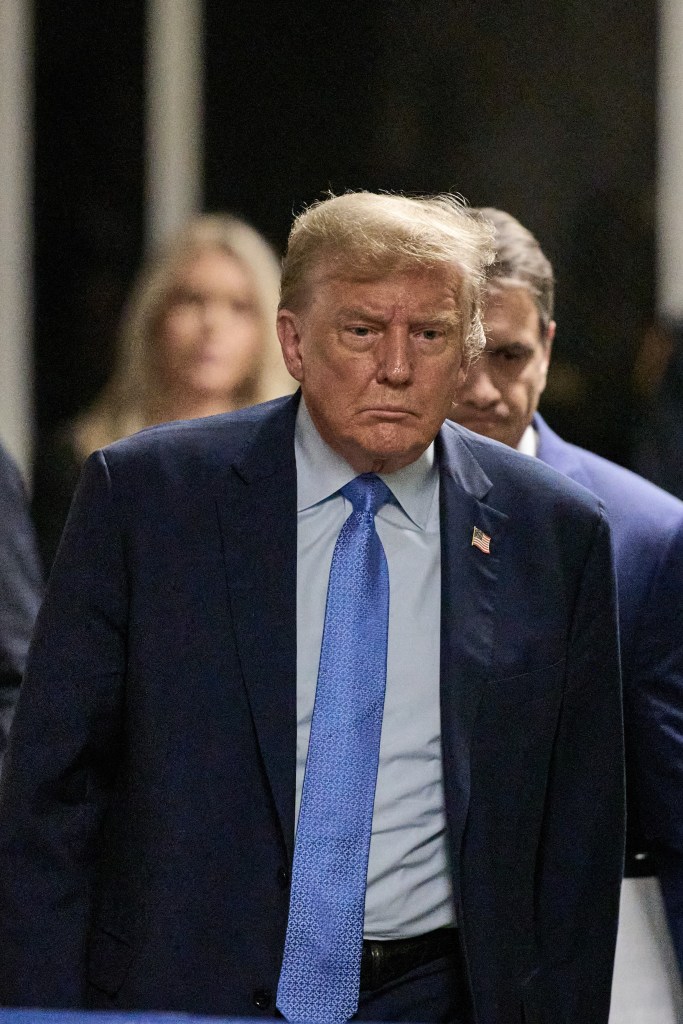Trump ‘hush money’ trial jurors ask for David Pecker ‘conspiracy’ testimony as day 1 of deliberations ends with no verdict
Contact The Author
Jurors at Donald Trump’s Manhattan hush money trial asked to revisit testimony about his role in an alleged conspiracy to hide sex scandals from 2016 voters as deliberations kicked off Wednesday in the unprecedented case.
The seven men and five women on the panel — including two lawyers, a retired wealth manager, a speech therapist, and people who both praised and criticized Trump — weighed the evidence for nearly five hours before breaking for the day.
“Mother Teresa could not beat these charges,” a glum Trump, 77, told news cameras in the courthouse hallway shortly after deliberations started at around 11:37 a.m.
“The charges are rigged. The whole thing is rigged,” the presumptive GOP presidential nominee claimed to reporters.
About three-and-half hours into their work, jurors came back with a note for the court asking to rehear testimony describing Trump’s alleged knowledge of what prosecutors say was an illegal scheme to buy and bury stories before the 2016 election from women who claimed to have affairs with him.
Jurors asked to revisit National Enquirer publisher David Pecker’s testimony about a June 2016 phone call in which he said Trump asked him whether they should pay Playboy model Karen McDougal to buy her silence about her alleged affair with the real estate mogul.
Pecker testified that he advised Trump to make the payment to “take the story off the market.”
“I believed the story was true,” he recalled telling Trump in the phone call.
“I believe it would have been very embarrassing to himself and also to his campaign.”
Pecker also recalled Trump telling him that he feared McDougal’s story would eventually get out anyway.
“[Trump] said, ‘I don’t buy any stories. Any time you do anything like this, it always gets out,’” Pecker testified.
Cohen called Pecker the next day and said “you should go ahead and buy this story,” — and Pecker ended up paying McDougal $150,000 to silence her, he added later in his testimony.
The jury also asked to re-hear both Pecker and former Trump “fixer” and personal lawyer Michael Cohen’s account of a key August 2015 meeting at Trump Tower.
The two prosecution witnesses testified to hatching the plan to bury women’s stories about affairs with Trump, and to publish puff pieces in the Enquirer extolling his virtues, during the meeting.
Trump’s lawyers, during Tuesday’s closing statements, tried to downplay the Enquirer’s impact on voters in 2016, while prosecutors noted that the magazine’s cover is visible in supermarkets across the country.
Jurors also asked to again hear Manhattan Supreme Court Justice Juan Merchan’s instructions for how they are expected to decide whether to convict Trump of illegally concealing a $130,000 hush money payment Cohen made to porn star Stormy Daniels.
Prosecutors claim that Trump Organization documents, including 11 invoices, 12 vouchers and 11 checks, all falsely describe the purpose of Cohen’s payments as “legal services” — rather than as reimbursement for the Daniels payout.
The jury could find Trump guilty of some or all of the 34 counts of falsifying business records that he faces — felonies that each carry theoretical prison time of up to four years.
Jurors, to convict, also need to believe beyond a reasonable doubt that Trump had the “intent” — defined as “conscious objective or purpose” — to cover up the “conspiracy” to get himself elected.
Jurors then have to decide that the alleged 2016 election conspiracy — involving the hush money payouts to both Daniels and McDougal — was done using what are called “unlawful means.”
But prosecutors, to convict Trump, “need not prove” that the underlying election crime was in fact committed” — just that Trump tried to cover it up, Merchan explained in his instructions to jurors Wednesday morning.
Panelists can take a choose-your-own-adventure path to deciding what those “unlawful means” are. They have three choices, Merchan said.
They could find that the hush money payouts breached federal campaign finance laws by exceeding the $2,700 cap on individual donations to campaigns, but only if the payouts wouldn’t have happened anyway even if Trump wasn’t running, the judge said.
Jurors could also find that the payouts violated tax law, or that more business records were “falsified” during the alleged conspiracy.
For example, jurors could find that the “unlawful means” are that Cohen fudged records by not being honest with banks when he created the shell companies that he used for the payoffs, Merchan said.
The jury’s notes could show that they are honing in on the election “conspiracy” part of the case.
“I think they have to since the government lacks Trump explicitly stating what a certain payment was for,” veteran New York criminal attorney Jason Goldman told The Post.
Start and end your day informed with our newsletters
Morning Report and Evening Update: Your source for today's top stories
Thanks for signing up!
But he cautioned against reading too far into the panelists’ requests.
“Trying to predict the meaning behind jury notes is like reading tea leaves,” Goldman said.
“At the same time, the transcript request is insightful and shows the jury is locked in on a few key players early on.”
Lawyers from both sides stayed back in court to finalize the portions of the transcript that will be read to jurors when they reconvene at 9:30 a.m. Thursday.
Trump sounded off again on the trial when he left court Wednesday, repeating his claim that the case is a “witch hunt.”
“No one knows what the crime is,” the former president claimed to reporters in the courthouse hallway.
“This is a disgrace.”



















